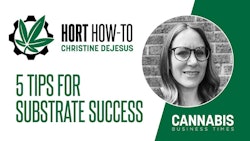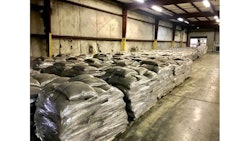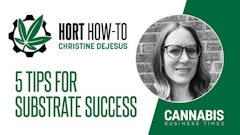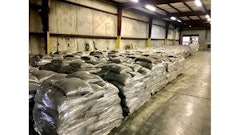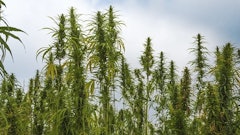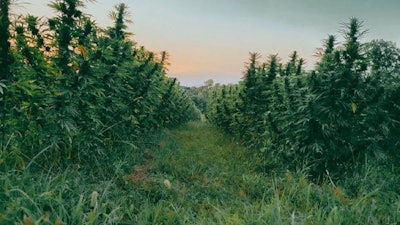
In 2020, the removal of a dam in Stillwater Creek flooded the valley below Joey and Amy Ellwood’s home and farm in Uhrichsville, Ohio, crumbling the road at the end of their driveway and shutting down traffic for the next two years.
The ensuing construction work was frustration enough, but thankfully the flooding and destruction did not affect the Ellwoods’ hemp crop. That was their second year working with hemp, and it was a good year. They met plenty of challenges along the way, but a sturdy, Ohio-bred bedrock of optimism, hard work and true passion for the plants had seen them through.
But would that be enough?
“I once heard a friend say, the farmer is the hub of the community. Connecting consumers to the creators or authors of a product is historically normal and what we aim to bring back,” Joey says at their dining room table in December 2022. Behind him, the wall is filled with numbers and plans for the business. “Working in the business is the most fun. But working on the business never stops.” Most hemp farmers can surely understand and sympathize.
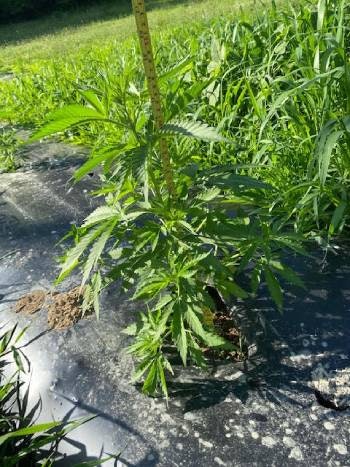
Now, in the winter bridging year two and year three in hemp, Joey and Amy are taking stock of what’s worked thus far and what’s not worked. This is the perfect time for such assessments. Last year at this time, after all, they made crucial adjustments that built off the early success of 2021 and provided an even more bountiful 2022.
RELATED: Use the Winter to Market, Network, and Dream: Help Your Hemp Business in the Off-Season
And now, with that second hemp crop cut and dried and cured (and processed into a range of SKUs in some cases), Joey and Amy and the full team behind Modern Remedies are flanking out across the state to sell finished products at farmers markets and brick-and-mortar stores. Balms, tinctures, gummies, honey, flower: You name it. To survive in hemp, interaction with consumers is critical. Joey and Amy call Modern Remedies a seed-to-sale hemp business, and they insist that controlling that supply chain is a bulwark against the harsh economic conditions of the legal hemp industry in America.
Especially those farmers markets and college campus visits. Joey calls his vendor booth sales “real-time market testing,” where he and the team garner a deeper understanding of what consumers want from hemp. He motions to the dining room table again, where a jar of their App Girls brand flower sits (the name a nod to the farm’s roots in the foothills of Appalachia). Inside, green buds of Suver Haze await eager customers’ discerning tastes. “Being at those markets is vital for that connection,” he says.
Amy agrees: She says she and her husband got into the hemp business as a natural extension of their own background (she was a nurse, he was a farmer). Hemp is no walk in the park, as any licensed grower will tell you, but there’s something special about this plant, after all. Growers know it. Customers know it. The key is to bring the grower and the customer together, to tighten up a business model and address the many needs in a given marketplace.
“All it takes is one customer to tell us how it helped them,” Amy says. “Then it’s all worth it.”
As the Ellwoods prepare for the 2023 season with the rest of their dynamic team, here are three tips they’ve learned along the way.
Have a plan—but be willing to deviate creatively.
The family decided to make a go of hemp in early 2020, and that first year went well. Joey and Amy and their team planted about 1,600 plants, but even at that scale the crop was highly demanding. It was not easy. With four kids at home and a sprawling, uncertain market outside their farm, the Ellwoods bootstrapped their way through the first year.
At one point, with a weeks-old infant in her arms, Amy wondered, “Is it worth it?” But the couple admitted that they loved this plant and wanted to see how far they could take it on their farm.
In year two, the Modern Remedies team took what worked well the prior year and assessed what was needed for the longer-term health of their farm.
Josh Crosier is a business consultant based in Athens, Ohio, and the founder of Soiled Obsessions. He had known Joey since high school, though they became close only when they both ended up as students at Ohio University. He has become critical to the success of Modern Remedies—through plotting out a plan for the hemp operation.
“Joey was actually willing to look at these mistakes, not get frustrated and then make the appropriate changes that were needed,” Crosier says. “That’s what it’s all about. We learned together so much in that first year. The improvements that were made just came naturally.”
The winter between 2021 and 2022’s hemp seasons proved critical. This is partly because Joey and Amy leaned into the plan they had developed with Crosier and their team, but also because they were willing to watch where the market took them. Growing high-quality hemp plants for smokable flower in 2022, for one thing.
“It’s also just as important to realize that even if you put together a foolproof plan, that plan is never going to work out exactly how you wanted,” Crosier says. “Flexibility is equally important.”
Drying and curing is critical.
To nail down their entrance to the smokable flower market, Joey and Amy knew they’d need to refine their drying and curing technique. Crosier was adamant about this.
In the winter leading up to the 2022 season, the Ellwoods and their team installed controlled drying rooms which brought their harvested plants out of the barn and into a dialed-in environment to produce top-notch buds.
“Hanging a whole bunch of plants in a barn, you’re never going to get that quality that you would trying to maintain that 60/60 temperature/humidity in closed rooms with air flow,” Crosier says. “That really helped them keep the green color. That’s the main distinguishing factor between why his stuff is in demand and why other [hemp flower] isn’t.”
Look into regenerative agriculture techniques for your farm.
And if drying and curing is vital on the back end of a harvest, Joey and Amy also recognized that the earlier foundation of their hemp crop was in need of constant improvements, too. Joey brings a sustainable ag mindset to hemp, and the couple is interested in cultivating a home that is based heavily around regenerative uses of their land. As they learned more about those practices, it only made sense to incorporate them into hemp.
“Our whole goal is to put our farm on a weight-gain program,” Joey says, referring to the idea of feeding the soil with nutrients—not necessarily the plants.
The team is practicing Korean Natural Farming (KNF), spearheaded by Crosier’s knowledge of soil health. This is a practice that will treat their land with care—but will also save costs in the long run.
One of the biggest hurdles along the learning curve of hemp, of course, is the pressing need to cut costs. With slim profit margins, every input cost matters. Crosier urged Joey and Amy to look closely at their soil, to better understand what, exactly, was being fed into their plants. “We’re still learning, and we’ll always be learning,” Amy says.
With KNF, the Ellwoods and their team are collecting indigenous microorganisms around the farm and then using those microbes to populate growing media for their hemp plants. This will ultimately result in highly dense populations of microbes in their soil, year after year. They aren’t planning on bowing out after just two years in the game; as a family farm, they’re in hemp for the long haul.
“Sustainable agriculture is really key for a family farm to survive,” Crosier says.
Time marches on. Well into the winter, trucks continued to move the dirt below the Ellwood family home, rebuilding the road in the wake of last year’s flooding. And inside the house on the hill, Joey and Amy plotted for their third year in hemp.
“We’re always looking into how we can improve,” Amy says.
Join us this year at the Paris Las Vegas Hotel & Casino for Cannabis Conference, the leading education and expo event for plant-touching businesses.










